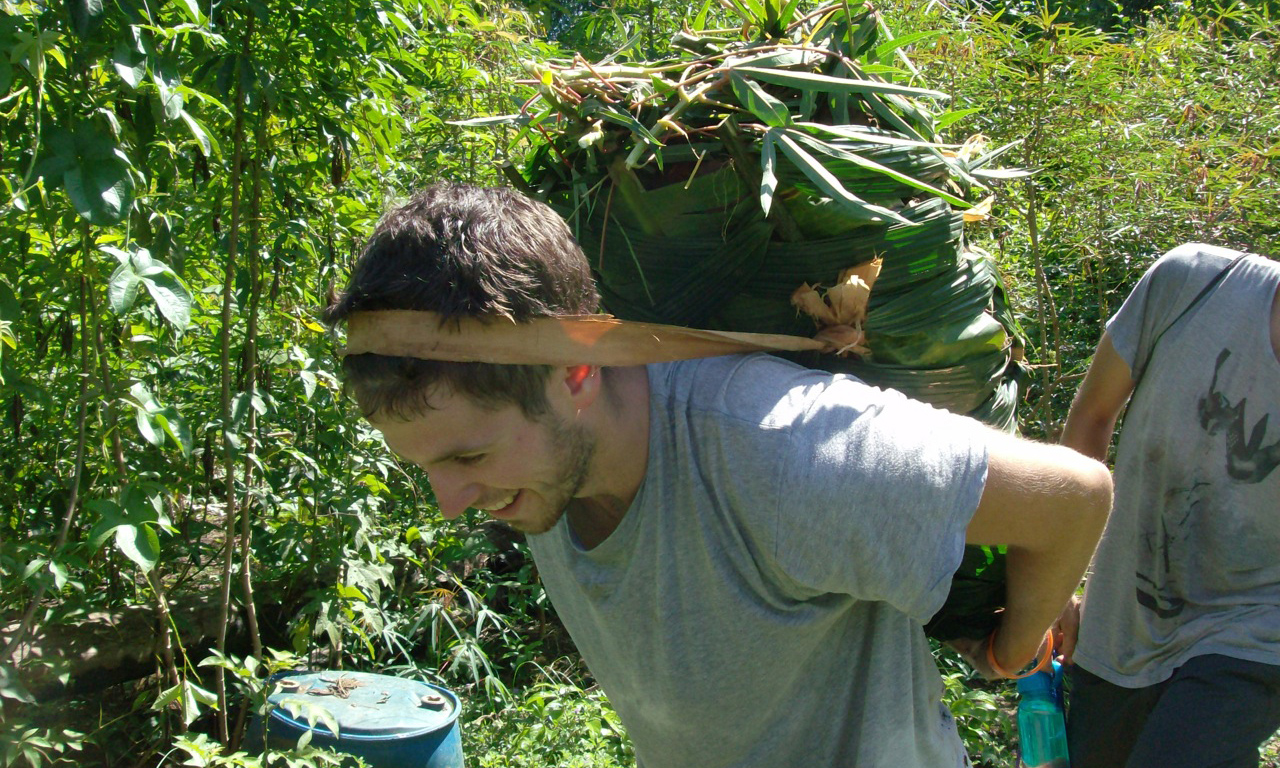One night last summer, Elliott Oakley found himself riding in a truck down the only dirt road that goes through the Amazon rain forest in Guyana. After the bus was ferried across a river, Oakley and 10 other students from the University of Virginia and the University of Mary Washington arrived at the village of Surama for a six-week course on ethnographic fieldwork methods. Mary Washington professor Laura Mentore led the course and U.Va. anthropology professor George Mentore, originally from Guyana, accompanied the group.
How did this Arlington native, who had already earned a prestigious Lawn room assignment for the upcoming academic year, end up so deep inside a South American country roughly the size of Idaho, located east of Venezuela and north of Brazil?
It started in his second year, when Oakley, then pointed exclusively toward majoring in economics in the College of Arts & Sciences, decided to take an anthropology class that seemed relevant: Mentore’s “Desire and World Economies.” There, for the first time, Oakley learned to question Western economic models and see that they are based on cultural assumptions he wasn’t even aware of, and found that other cultures have different ideas about value and exchange. He decided to add a second major in anthropology, starting on the path toward Guyana.
Mentore said not many undergraduates have the opportunity to conduct fieldwork in a place like the South American village his group visited.
While living with about 300 Amerindian people – the Makushi, Oakley immersed himself in daily life, he said. He learned how to sleep in a hammock and weave one on a large loom, plait a small straw basket, carry a large bundle of sweet potatoes on his back, build a thatched roof and live daily using a minimum of electricity.
In his distinguished anthropology major’s thesis, Oakley analyzed the Makushi practices of daily life he learned and “the beauty of a steady social balance made and remade in the repetitions of the everyday.”
Mentore called his research “an innovative project having to do with indigenous Amerindian notions of numbers, time and space.”
Oakley uses anthropological concepts “to understand Makushi replication and repetition across scales [or levels] in weaving together social personhood and village sociality” in his thesis, “Pathways and Pairs: The Interwoven Enactment of Embodied Knowledge.”
In other words, a Makushi person learns and confirms his or her part in the community by doing and repeating well-known physical tasks – “the daily movements of making and doing, which confirm and continue the interwoven thought and feeling of embodied being.”
“In American daily life, we can distinguish mental tasks from physical ones, or separate mind and body,” Oakley said. “For the people I worked with in South America, knowledge is shared through doing things with other people – not just telling them.”
If Oakley didn’t have something already scheduled to do, he would simply go to the village and look for people doing something. One day it was gathering sweet potatoes; another it was helping a group work on a soccer field. In fact, playing soccer before it got dark became another daily routine that took on new social meaning for him, he said.
A rower since high school, Oakley is president of the U.Va. Men’s Rowing Association this year. Mentore saw a connection between his student’s participation in the sport and his role in village life. (Mentore also teaches a course on the anthropology of sport.)
“During this time, I had the opportunity to witness firsthand the leadership qualities and diplomacy potential Oakley possesses,” Mentore wrote. “In the tight social environment and intimacy of Amerindian village life, one gains a considerable amount of insight about individuals, knowledge usually unobtainable when living in the formal and familiar settings of home.”
Oakley “proved repeatedly how his training as coxswain for his crew team at home provided him with the means to guide and encourage his fellow classmates. He did this in such a fashion that he gained both respect and affection from them.
“He was a caring and empathetic companion not only to his peers, but also to his indigenous village hosts,” Mentore wrote.
Oakley said the people were “kind and generous. If you show up there with a hammock and you’re willing to work, you can become part of the family.”
Despite the slower rhythm of life, the Makushi are not cut off from the modern world, Oakley said. They have Internet access. They have a locally owned ecotourism business and use solar power. It’s a big decision among people when to use fuel. Some of the villagers have traveled with indigenous groups to other countries.
At the same time, the Makushi maintain a sense of self that is coherent with their community history, Oakley said.
A Harrison Undergraduate Research Award helped support Oakley’s trip, enabling him to learn how to develop a research plan and follow through with reading, writing and fieldwork. Along with a fellow student, Caio Setubal, Oakley studied and wrote about the Makushi’s ways of understanding and expressing mathematic concepts.
Their project looks at “how people think about counting and grouping the things they encounter, and notions of spatio-temporal orientation – how people understand their position within their community and broader world, including spirituality, and in relation to the past, present and future,” Oakley wrote.
His immediate future will be different from living on the Lawn or in an Amazon village: Oakley will head to Monmouth School in Wales to teach economics and coach high school rowing through U.Va.’s U.K. Fellows Program. After that, he’ll attend the University of Edinburgh for a Ph.D. in anthropology, intending to return eventually and continue working with the Makushi.
Another of his professors, Fred Damon, predicts that Oakley will be one of the best anthropologists of his generation.
Media Contact
Article Information
May 12, 2013
/content/class-2013-elliott-oakley-rocks-hammock-amazon

